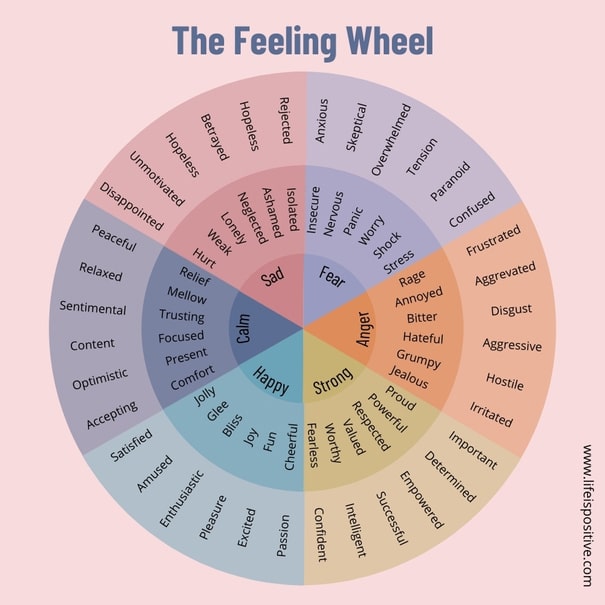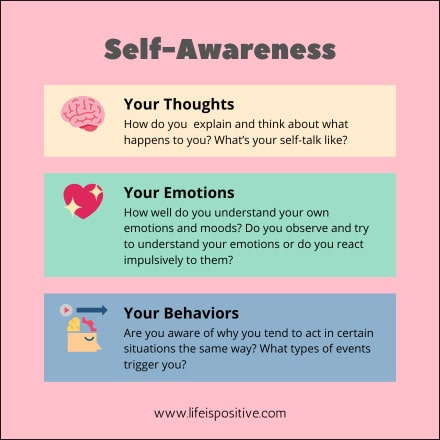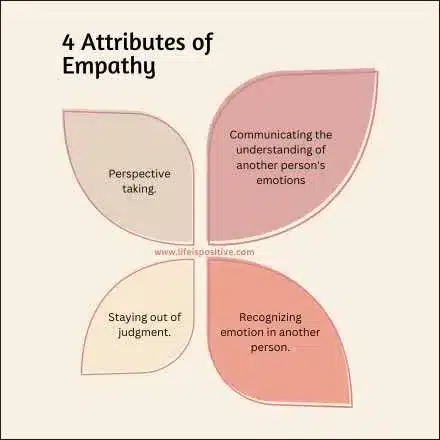|
Getting your Trinity Audio player ready...
|
Let’s be honest—emotional maturity isn’t the kind of thing that gets you like on Instagram or makes for great party banter. It’s not flashy, and it’s definitely not a quick fix.
But guess what? It’s actually one of the most underrated life skills out there, and mastering it can transform your life in ways you might not expect.
Being emotionally mature can completely change the game—whether it’s improving your relationships, finding your inner peace, or navigating life’s inevitable curveballs with grace and resilience.
It’s about learning to respond rather than react, to understand yourself and others on a deeper level, and to approach each moment with a sense of calm and clarity.
So, if you’re ready to upgrade your emotional toolkit and embrace a more centered, peaceful way of being, hang tight. We’re about to dive into some real talk and share practical tips on how to level up your emotional maturity starting right now.
Because let’s face it: this journey might not be Instagram-worthy, but the rewards are far more valuable and lasting.
What Does It Mean to Be Emotionally Mature?
Before we get into the nitty-gritty, let’s define what we’re talking about here. Emotional maturity isn’t about being perfect or never getting upset. Nope, it’s about handling your emotions in a way that’s healthy, balanced, and—dare I say it—mature.
When you know how to be mature emotionally, you don’t let your feelings run the show. Instead, you acknowledge them, understand them, and respond in a way that’s thoughtful and controlled. Sounds pretty cool, right?
Now, you might be wondering, “Why should I care about how to be mature emotionally?”
Well, emotional maturity can make or break your relationships, help you navigate life’s ups and downs with grace, and even deepen your spiritual life.
When you’re emotionally mature, you’re not just reacting to the world—you’re engaging with it in a meaningful way.
Read: What is Emotional Intelligence And How to Empower It
Tip #1: Take Responsibility for Your Feelings
One of the first steps in becoming emotionally mature is learning to take responsibility for your own feelings. It’s so easy to fall into the trap of blaming others for how we feel—saying things like, “They made me angry,” or “She hurt my feelings.”
But here’s the truth: no one else is responsible for your emotions but you. Your feelings are yours, and they are reflections of your inner state, not someone else’s actions.

When you start owning your emotions, you reclaim your power. Think of it like this: your emotions are like a car, and you’re the driver. Other people might cut you off or force you to slam on the brakes, but at the end of the day, you’re the one behind the wheel.
You decide how to react, how fast to go, and which direction to take. Emotional maturity is about recognizing that you have this power and choosing not to let anyone else grab the steering wheel.
Read: How to Deal with Feeling Overwhelmed
By accepting responsibility for your feelings, you move from being a passenger to being the driver of your emotional experience. This doesn’t mean you won’t encounter bumps in the road or that others won’t challenge you.
But it does mean you have a choice in how you respond. You can choose to react with anger, or you can choose to pause, reflect, and respond with calm and clarity.
So, next time you feel a surge of emotion, remember that you are in control. Take a deep breath and remind yourself that your feelings are yours to manage.
By doing this, you’re not just learning how to be mature emotionally—you’re also setting yourself on a path to greater self-awareness and inner peace.
Tip #2: Practice Self-Awareness
Self-awareness is like your emotional navigation system. It guides you through the complexities of your inner world, helping you understand where you are, where you’re heading, and how to reach your destination with as few detours as possible.
It’s an essential tool for emotional maturity, enabling you to chart a course through life’s ups and downs with greater ease and understanding.
When it comes to maturing emotionally, self-awareness is key. It starts with recognizing your emotions as they arise and gaining insight into what triggers them. This isn’t about judgment or criticism; it’s about observing your feelings with curiosity and compassion.
By regularly checking in with yourself throughout the day, you begin to cultivate this awareness. Simply ask, “What am I feeling right now?” and “Why am I feeling this way?” These questions invite a deeper understanding of your emotional landscape.
Read: How to Build Emotional Strength: 15 Powerful Tips
The more you practice this mindful awareness, the better you’ll become at catching your emotions before they spiral out of control.
It’s like learning to steer a ship—you become more adept at navigating rough waters, anticipating changes, and adjusting your course. Over time, you’ll find that being tuned in to your feelings allows you to approach life with a clearer mind and a calmer heart.
So, make it a habit to pause and reflect on your emotions. This small practice of self-awareness can transform how you experience and respond to the world around you.
When you’re attuned to your inner self, you’re better equipped to handle whatever comes your way with grace and confidence.
Tip #3: Learn the Art of Communication
Here’s a little secret: emotionally mature people are great communicators. They have a unique ability to express their feelings clearly and calmly without blowing up or shutting down.
This doesn’t mean they don’t feel deeply; in fact, it’s quite the opposite. They’ve learned to navigate their inner world with grace, which allows them to communicate effectively and honestly.
If you want to cultivate emotional maturity, start by honing your communication skills. This means becoming more aware of how you express yourself, especially when you’re upset. Instead of lashing out in anger or bottling up your emotions until they spill over, try talking it out in a way that’s constructive.
Use “I” statements to express how you feel. For example, say, “I feel hurt when…” rather than “You always…”. This simple shift in language can open the door to more understanding and less defensiveness.
Read: 9 Ways to Communicate Your Wants in A Relationship
By focusing on how you communicate your emotions, you’re not only honoring your own experience but also inviting others into a space of empathy and connection.
This approach transforms potential conflicts into opportunities for deeper understanding and growth. Remember, the goal isn’t to avoid difficult conversations but to approach them with a sense of calm and clarity.
So, next time you feel your emotions rising, pause and take a breath. Reflect on what you want to communicate and how you want to say it. This practice of mindful communication is a powerful tool on the path to emotional maturity.
It helps you express your truth with kindness and respect, fostering healthier and more meaningful relationships.
Tip #4: Embrace Empathy
When you’re learning how to be mature emotionally, empathy is a skill you’ll want to master. It’s about more than just understanding someone else’s words—it’s about stepping into their shoes and seeing the world through their eyes.
Empathy allows you to connect with others on a deeper level, feeling what they feel and understanding their experiences and emotions as if they were your own.
The next time you find yourself in a challenging situation, take a moment to pause and consider the other person’s perspective. Ask yourself, “What might they be feeling right now? What’s their experience? What are they going through?”
This simple shift in focus can transform the way you interact with others. Instead of reacting out of frustration or misunderstanding, you approach the situation with compassion and insight.
Read: How to Take Your Power Back and Transform Your Life
By practicing empathy, you can defuse tension and create a space for open, honest communication. It builds stronger relationships because people feel seen, heard, and understood.
Over time, as you make empathy a habit, you’ll find yourself becoming a more compassionate person overall. You’ll notice how your ability to connect with others deepens, and how your own emotional world becomes richer and more expansive.
Empathy doesn’t just benefit those around you; it enriches your own life as well. It opens your heart and mind, allowing you to experience life from multiple perspectives.
And in doing so, it helps you grow into a more emotionally mature, understanding, and loving version of yourself.
Tip #5: Don’t Run From Your Emotions
Let’s be honest: emotions can be messy. They often come in waves, crashing into our lives with a force that feels impossible to ignore. But here’s the thing—emotional maturity isn’t about avoiding these waves or running from the storm.
It’s about learning to sit with those uncomfortable feelings and embracing them for what they are: powerful messages from within.
Whether it’s sadness, anger, or fear, these emotions aren’t just random or pointless. They have something valuable to teach you, but only if you’re willing to listen.
Read: 3 Secrets You Need to Master Your Wellness Trifecta
The next time you’re feeling overwhelmed, try something different. Instead of reaching for a distraction—like scrolling through your phone, watching TV, or diving into work—take a moment to pause.
Take a deep breath and really tune in to what you’re feeling. Ask yourself: What is this emotion trying to tell me? What do I need in this moment to feel supported or safe?
By facing your feelings head-on, rather than avoiding them, you open the door to growth and self-awareness. It’s not always easy, and it certainly won’t feel comfortable at first, but it’s through this process that you cultivate true emotional maturity.
You’ll start to see patterns, understand your triggers, and discover deep insights about who you are and what you need.
So, give yourself the space to feel. Honor those emotions, even the messy ones, because they’re part of your journey towards understanding yourself more fully. And in doing so, you’ll not only find healing and wisdom but also a deeper connection with your true self.
Tip #6: Know When to Let Go
Sometimes, the most mature thing you can do is let go. Whether it’s an old wound, a grudge, or even a relationship that no longer serves you, holding on too tightly can leave you feeling stuck and unable to move forward on your journey.
We often cling to these things out of fear or habit, but in doing so, we prevent ourselves from embracing the present and opening up to the future.
A big part of emotional maturity is recognizing when it’s time to release what’s weighing you down. This isn’t about giving up or denying your feelings; it’s about making a conscious choice to prioritize your peace and well-being.
Letting go means choosing healing over holding onto pain and understanding that true strength comes from your ability to move forward with grace and resilience.
Think of it as creating space in your heart and life for new experiences and emotions that can help you grow and flourish. By releasing what no longer serves you, you make room for joy, love, and new beginnings.
It’s about trusting that what is meant for you will come and that every ending creates the possibility for a new beginning.
So, take a deep breath and ask yourself, “What am I holding onto that’s holding me back?” Then, with compassion for yourself, begin the process of letting go.
In doing so, you’re not just freeing yourself from the weight of the past—you’re also inviting in a lighter, more expansive future. This act of release is one of the most profound steps you can take on your path to emotional maturity and spiritual growth.
Final Thoughts: How to Become Mature Emotionally
So, why does emotional maturity matter? Well, developing emotional maturity can deeply enrich every aspect of your life.
In your relationships, it nurtures trust, respect, and a deeper, more meaningful connection with others. In your journey, emotional maturity allows you to engage more fully with your faith, opening your heart to greater understanding, wisdom, and growth.
Read: The 15 Commitments Of Conscious Leadership
When you’re emotionally mature, you’re not just reacting to whatever life throws at you—you’re engaging with it in a thoughtful and intentional way. You handle challenges with grace, communicate with clarity, and create deeper, more meaningful relationships.
And honestly, who wouldn’t want that?
If you’ve read this far, congrats—you’re already taking the first steps toward emotional maturity. Remember, this isn’t a quick fix; it’s a journey, not a destination.
Emotional maturity takes time, practice, and a lot of patience with yourself. But the rewards are so worth it.
So, keep these insights close to your heart, stay open to your own growth, and watch how your life starts to change in ways you never imagined.
For more empowering content, connect with our vibrant community here ➡️ Social Media.



